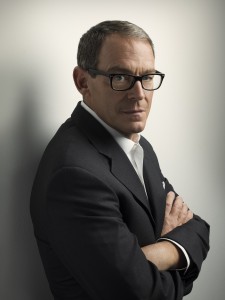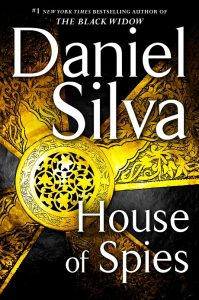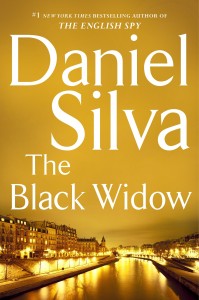 Daniel Silva is the international award-winning author of the Gabriel Allon series which has topped the New York Times’s bestseller list many times. He burst onto the literary scene with his debut novel, The Unlikely Spy, which became a bestseller.
Daniel Silva is the international award-winning author of the Gabriel Allon series which has topped the New York Times’s bestseller list many times. He burst onto the literary scene with his debut novel, The Unlikely Spy, which became a bestseller.
He soon began writing books about Gabriel Allon, an Israeli art restorer, assassin and spy. These novels have been translated into twenty-five languages and are available in more than thirty countries. Before becoming a novelist, Daniel was the Chief Middle East Correspondent for UPI in Egypt, and the Executive Producer of CNN’s Crossfire.
In House of Spies, London is the target of a horrific ISIS attack. Though coordinated brilliantly, there is one loose thread which leads Gabriel to the south of France where contact is made with a wealthy Frenchman and a British former fashion model. Gabriel must expertly engineer the situation to fight the global war on terror.
You completed “House of Spies” just before the recent ISIS attack in London. And last year, you completed “The Black Widow” just before the Paris attack. Is this prescience or do you have connections in the world’s intelligence communities?
It’s a little of both. Anyone who seriously follows these issues knew ISIS was desperate to attack the United Kingdom. ISIS painted a bulls eye on the UK. There were twelve or thirteen plots British intelligence and security services thwarted and disrupted, but it was only a matter of time before one slipped through the cracks. The Director General of MI 5 told the British people point blank there would be attacks in Britain. That’s why I chose to use Britain as a jumping off point for this story. While I was deeply saddened to see certain aspects of my b ook actually happen, I was not at all surprised.
ook actually happen, I was not at all surprised.
“House of Spies” involves two fascinating new characters—one is Jean-Luc Martel. Tell us a bit about him.
Jean-Luc Martel is a wildly successful French entrepreneur who is in the hospitality industry—restaurants and hotels. That’s all a cover for his job as a drug trafficker.
After the eruption of the Arab Spring, and the eventual toppling of Muammar Gaddafi, ISIS set up shop along the Libyan coast, moving huge shipments of hashish and narcotics into Europe.
In my book, Jean-Luc Martel’s drug network is doing business with ISIS.
This presents Gabriel Allon and his allies an opportunity to penetrate ISIS indirectly by enlisting France’s biggest drug dealer as an unwilling asset of Israeli and French intelligence.
Among other things, the book explores the very real subject of coerced recruitment of assets.
The other new character is Olivia Watson. Tell us about her.
Olivia Watson is a former British fashion model who left the industry with some expensive habits, shall we say. She wasn’t in great financial shape and wanders down to St. Tropez where she works in a small art gallery. She meets Jean-Luc Martel. They form a partnership. He sets her up in business in a posh art gallery, but the gallery is a front for a giant money laundering machine for his drug enterprise.
Is there some significance to your having decided to make Gabriel Allon, a spy-assassin, and also an art restorer?
When I created Gabriel, I wanted him to have a distinct and prominent “other side” to his character. He had been a gifted painter, until he lost his will to create art because of his work as an assassin for Israeli intelligence.
Art restoration not only provides the perfect cover for him, but allows him to stay connected to art, which is his passion.
He’s a complex man, and it’s important to me that the reader see him in all his dimensions.
At the time I was creating Gabriel, I happened to be having dinner with one of the world’s foremost art restorers. He helped me turn this Israeli assassin into a restorer of Italian masterpieces.
You publish a new book during the second week of each July. Is there any significance to that date?
If you look at the publishing calendar, many authors publish books around the same date each year, whether it’s John Sandford, Lee Child, Michael Connelly, or myself. We all have our ‘slots.’ Mine became the second Tuesday of July. I’ve had at least ten books published on that day: it helps the industry with such things as production schedules and ordering; and hopefully, I’ve got readers who know to look for my next book at that time.
How long does it take you to write a novel?
Roughly, from Labor Day until April Fool’s Day. I finish my draft by about March first, and spend the next month rewriting and editing.
Do you have first readers for your novels?
I rely on two people only: my wife, and Lewis Toscano, my editor. Lewis has been editing my manuscripts and making them better since I was a twenty-four-year-old kid.
I’ve learned you write in longhand on a legal pad. Is that true?
Yes, that’s true.
Why not use a computer for that first draft?
I do use a computer for parts of that first draft, but I sit comfortably and quietly while I write in longhand. I think better by writing in longhand. I love the quiet atmosphere of it. I prefer not staring at a computer screen all day. For me, the pace of putting words on paper with the human hand lets me form my sentences as I go. I end up with a skyscraper-tall pile of legal pads by the end of a book.
I’ll tell you something: you could go through those papers and pull out large sections of the novel written in one take from beginning to end. For me, writing in longhand produces a far more polished first draft than I could ever produce by typing on a keyboard. I think it has to do with the slower pace of physically executing words and sentences. Thoughts go from my brain to my fingers and onto the paper via my pen.
All your novels, have plot twists and explosive turns. Do you usually pre-plan them or do they arise as you write?
For the most part, they arise as I write.
I don’t outline at all. My first draft is my outline. [Laughter]. I tried outlining once and felt it was a complete waste of time.
Tell us about the deal with MGM Television to turn Gabriel Allon’s adventures into a series. And why TV instead of a feature film?
It’s the deal I’ve been waiting for. We’re moving forward at full speed.
I had to make a basic choice: film versus television.
That decision became easy when I considered having the prospect of twelve hours of a television series devoted to Gabriel Allon versus two hours of film.
There’s a vast amount of material to capture and explore, and I’m fascinated by the prospect of seeing some of the older material updated.
Television has become quite innovative, and I think it was the way to go.
You once said you wanted Gabriel to live solely on the page. What changed your mind?
For many years, I was convinced Gabriel should live only on the page.
But, after The Black Widow was published, I was inundated with so many offers, I was finally able to feel pretty confident that the offer I would ultimately select would get the complex character of Gabriel and the tone for the series done correctly.
Do you see Gabriel Allon continuing for many more books?
That’s a difficult question to answer. Let’s just say that I’m working on another Gabriel Allon novel right now. [Laughter].
Congratulations on penning “House of Spies,” another electrifying novel about one of the most intriguing protagonists on the planet.





